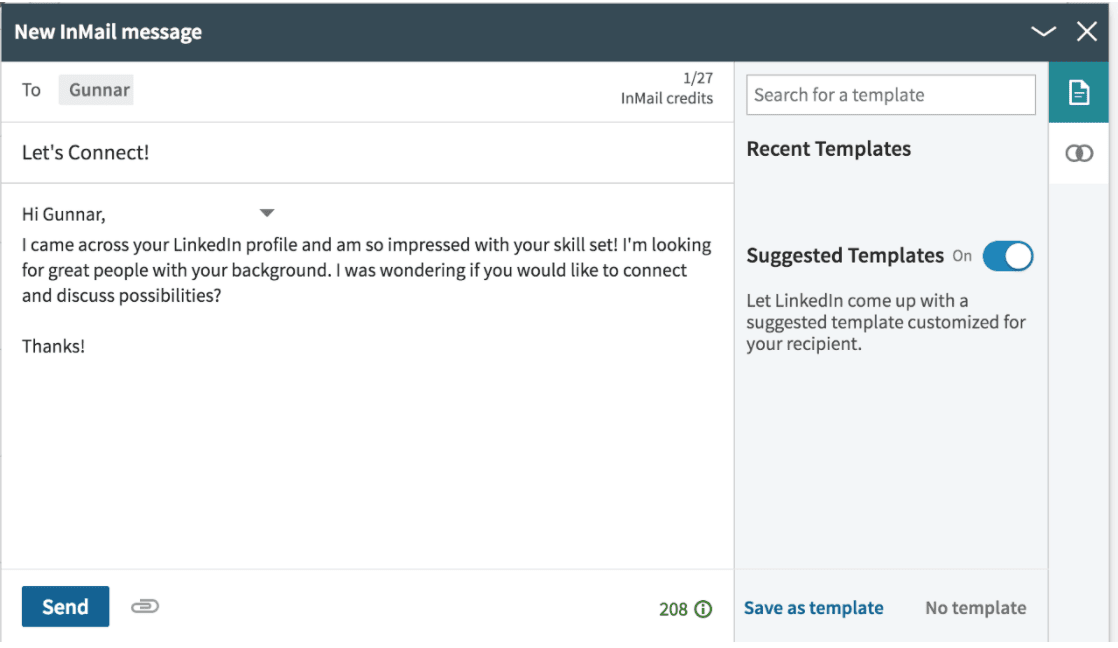
Blind men and an elephant (Wikipedia) is an Indian story of a group of blind men. Each man feels a different part of the elephant body. They then try to conceptualize and fight over what the elephant is really like. The same way candidates complain about recruiters because they lack the understanding of their incentives and the broad market-view.
Why should you start a recruitment agency?
When I told my parents that I want to leave my cushioned, well-paid, relaxed software engineering job, my dad thought that I am crazy.
They raised me to become an engineer, just like my dad, and I got a very lengthy education as an MSc in computer science. They believed it is insane to “throw all this away”.
My dad got all his jobs by applying for newspaper adverts, what the purpose of recruiter is. People convolute their personal view with the market view. Hence, they don’t understand why recruiters even exist. I can explain it in this way: Jobseekers and hiring firms are like gamblers coming into a casino; they are winning and losing in certain, specific ways; they fit to each other, or they don’t. If you’re a successful recruitment agency, you are the casino. You see all interactions, and you don’t care about the individual events of losing and winning as long as at the end of the day, you place people into jobs, and make some money.
If you want to succeed, you need to take risks; don't listen to your parents; their advice is biased towards security. If you want to start a business look at the base rates. Restaurants, for instance, are usually a bad business; your margins are low, about 20%, and your fixed costs are high (you need to have physical assets). Recruitment is the opposite. Your margins are very high, more like 80%, and your fixed costs are low.
Recruitment has great properties such as:
- The randomness element of trading: great candidates either respond to you or they don’t; it dependents on how you approach them, but a the end of the day, luck plays a role, which means you are subjected to positive Black Swans.
- The low starting cost of a software firm: you need a computer and a phone, which you likely already have.
- Earn as much as you want, gig-economy style: You have the potential to be earning money throughout your entire waking time. You can call and answer e-mails almost all day; recruitment — especially when one starts — is dependent on activity, quantity; quality is important, too, but comes later. Compare that to coding: You can’t do focused work for more than 4-6 hours in a row. (Coding “overtime” can destroy a software product. See the story of this Polish game company that forced programmers to work overtime, which lead to a broken product, disappointed users and a nose-dive of the company’s stock.)
Recruitment is ”Lindy”
Recruitment is an ancient profession and will stay with us for a while: “The Lindy effect is a phenomenon by which the future life expectancy of some non-perishable things, like a technology or an idea, is proportional to their current age.” - Wikipedia
Julius Caesar offered three hundred sestertii to anyone who recruited someone into the Roman army. The payment was 30% of a soldier’s yearly salary.
In the World War II Era, “modern” recruitment agencies appeared in the 1940s to fill open vacancies. Afterward, the main job of these agencies was to help veterans find jobs.
How to start
You must understand that “Recruitment is a numbers game”, but what does that mean in practice?
It means you have to put in the effort to get results. You need to be smart if you want to survive:
- Leverage your existing network: if you are a programmer, recruit programmers, and get clients from the same network (this is what I did). You’ll have an unfair advantage and will need to work less hard to get good results.
- Put your spin on it: have every candidate answer a specific set of questions; detailed interview notes will delight your clients (they are a must in my opinion)
- Make your terms & conditions simple; have contracts with one to two pages, everyone else has 10 pages or more, stand out by signalling that you’re easy to work with.

(Otherwise, ignore the competition and focus on yourself.)
Let's say, you decided to focus on searching Java or frontend engineers in your city (hard but rewarding choice). The quickest way to find a fit is to first think of whom you know and reach out to these people: call them. During the chat, regardless if they are interested in a new position, ask them, "if you would be in a position to hire for this role, to whom would you talk to" (quote attributed to Rich Rosen).
In parallel, make a straightforward social media post image the main characteristics about the job and post it online. You can use our free tool https://go.klang.so for that. Here an example of a role I am currently working on:

Especially for rare roles like that of CTO, you’ll need to establish a brand before you’re asked to headhunt for such gigs. With regular Java or frontend roles, you’ll get clients even if you don’t have a brand -- there is so much need for pure engineers that companies are willing to work with anyone.
Before you pay for tools
Before buying a Recruiter Lite license for ~100 USD/month, use the free search interface to filter for candidates and send relevant connect requests with personalized messages.
When you have around 500 connections in the relevant geographical region, use “InMails” to reach as many people as you can. InMails work better for business roles and less well for technical ones.

LinkedIn’s default template suggests how to message people via inMail generically; it is a good start, but should be adapted to the role and the person, the more personalized your outreach, the better the results.
Most candidates will ignore your messages, some will react with hateful answers, and very few will reply with something positive such as: “I currently would love to explore other options.” When you hear something like this, congrats, you did it, you found your first prospect! Call them as soon as you have their CV. (That is why our klang.so ATS has an instant calling option.) Don’t waste time; other recruiters might also be reaching out to them at the same moment. I mean that very seriously, don’t waste even a second, call them and discuss the role, get relevant information, write solid candidates notes, and immediately send them to the clients.
When I started, nobody told me the importance of speed, I ended up in several terrible situations where another recruiter sent the same profile before me, sometimes with as little time difference as an hour! All the weeks-long search, assessment for nothing. Be more intelligent than me; never let this happen to you.
How to get clients
When I started recruitment, I was new in Switzerland , and I had no contacts. I went to every tech event from Monday to Thursday for 3 years straight. People were joking about me that “I am the guy who’s at every event”. I went regularly to build a network but also to learn about tech (I was a junior developer back then).
I got all my leads all through meetups. I told everyone I am a programmer who also does recruitment and companies were intrigued. My best clients and closest friends stem from random in-person encounters. During Covid-19 everything stopped and I had to change strategies to generate new business.
With new clients, I try to have at least one personal meeting. The companies who treated me well later all agree to meet in-person at some point. All clients who treat me badly were those I never met in-person. There is something invisible that builds trust at in-person meetings. People tend to forget this now.
Low barrier to entry and instant cash flow
When starting your own recruitment agency, you have to check if there are some impediments first; e.g., in Switzerland, I had to get a recruitment permit, for which I had to jump through some hoops. You’ll have to set up a limited liability company, or you could operate as a sole proprietor. Recruiters often are sole proprietors because it’s just simpler to set up. The liability can be minimized if you formulate your recruitment contracts well.
Before you let bureaucracy suffocate you, focus on making money. I had my first placement happen right before I had my company structures in place. The client agreed to sign the deal, and I quickly finalized my company papers so everything could go through. I can’t stress this enough, first focus on making money. Recruiters get 15–30% of the yearly salary of a (tech) candidate per placement. Think about it: If you do four to five successful placements a year, you’ll be earning as much as the person in the field you’re recruiting in.
Fees depend on the domain and region. Try to network and find out what the market rates are for your area, and charge that at first. Some clients require a guarantee that the person doesn’t leave within 3–6 months (in which case, you’ll have to pay the money back partially.) Have a simple standard contract, and attempt to do great work. Try being average on price but over-average on the result, and you’ll be able to raise rates soon.
When you run a small business, you have to adjust all the risks, lack of unemployment benefits, risk of being unable to work, etc.; aim to make at least double what regular employees in your fields make to be on the safe side.
Successful recruiters, like Rich Rosen, place approximately one senior candidate per week; hence, they make about a million US dollars in fees a year on average as a 1-person company. To get to this level you need to gain a lot of experience, and a world-class network. The best is to have started yesterday, the second-best is to start today!
If you want to hear more details, follow me anywhere. If you liked this blogpost, you might enjoy:
We have built klang.so to make recruitment suck less for small recruitment firms, book a demo to hear more: iwan@klang.so, +1 (551) 261-5955, request access:





